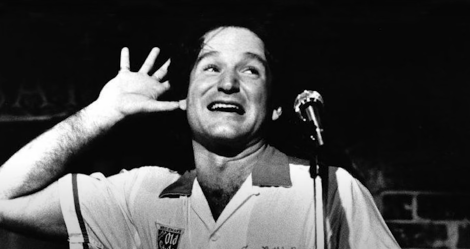




On August 11, 2014, the world got a bit sadder and a lot less funny. That’s the day we learned Robin Williams, the great, mercurial talent of his generation, had died.
His death by suicide added to the shock, until we thought about it. Manically funny and wistfully melancholy, a man who’d battled addiction and other personal demons, it wasn’t just the media that leapt into speculation about what drove him to hang himself.
It was rare, in interviews, to not have his sad side show up. I know I saw it the few times we talked. The “unhappy, depressed clown” narrative gained a foothold, even among those who loved him. Those who didn’t wondered what drugs he had in his system.
But we were all wrong. He didn’t know, his wife didn’t know, his doctors had thought Parkinson’s and depression, and they were wrong. It wasn’t until that fall that the coroner’s report showed what had really gone haywire in his brain.
“Robin’s Wish” is a documentary that expands on the interviews his widow did once that diagnosis — “Diffuse Lewy Body Dementia” — became known. It’s a film that chronicles his decline, the panic he felt over it, what friends, neighbors, colleagues, his handler for his many USO tours and his widow, Susan Schneider heard and saw and could not understand.
Despite his access to neurologists and some of the best healthcare America has to offer, Williams didn’t realize that he was “at the mercy of something he could not control…and didn’t know about,” his director in the “Night at the Museum” movies, Shawn Levy explains.
One of the medical experts here lets Williams, those close to him and even those treating him off the hook by noting “the last thing they think of is a degenerative brain disease.” And he had “the worst case of it I had ever seen,” notes Dr. Bruce Miller of the Memory and Aging Center of UC-San Francisco. The post mortem evidence was stark.
“Robin’s Wish” quickly sketches in Williams’ career, his brief stay at Juilliard where he studied Shakespeare but “would make up lines in iambic pentameter…X-rated lines,” in rehearsals, where he befriended Christopher Reeve and actor Stanley Wilson (seen here), his connection to stand-up and the Mill Valley theater where he still performed it, on occasion, close to his Tiburon, California home.
David E. Kelley, creator of Williams’ final TV series, “The Crazy Ones,” Levy and others marvel at the explosions of wit, the endless riffing on takes, “every one of them different, a lot of them…gold” on movie and TV sets, recording the genie in Disney’s “Aladdin.” Being “that Robin Williams” made his sudden decline doubly alarming because he never wanted to let people expecting him to bring the fun down.
The stated purpose of the documentary is to ensure that no one still harbors those notions of a rich, successful comic taking his own life through self-destructive addictions or impulses. “Suicide,” we’re told, is far-too-often the end result of the onset of this Diffuse Lewy Body Dementia. I like what his friend, the comic and filmmaker Bobcat Goldthwait says in a radio interview included in the documentary.
“His brain was giving him false information,” making Williams manic, insecure, unable to remember lines, giving him a left-arm tremor and making him think “I’m not me.”
The film’s narrow focus and heavy reliance on his third wife, Susan Schneider and the lack of testimonials from his three children, gives “Robin’s Wish” an odd aftertaste, especially when you remember the legal fight over his estate where “Robin’s wish” was that his children inherit pretty much everything. The title itself seems like a final shot in that battle.
But zeroing in on Robin’s disease, his decline and what she and a few others close to him observed, with plenty of medical explanations, make this brief film feel complete, in its own way. What they’ve made is a solid, medically sound and emotional final chapter in a life that touched many, one that deserves to be remembered for how he really lived and what truly caused his death.

MPAA Rating: unrated
Cast: Robin Williams, Susan Schneider, Mort Sahl, Shawn Levy, Stanley Wilson, David E. Kelley and Bobcat Goldthwait
Credits: Directed by Tylor Norwood, script by Scott Fitzloff and Tylor Norwood. A Vertical release.
Running time: 1:17
